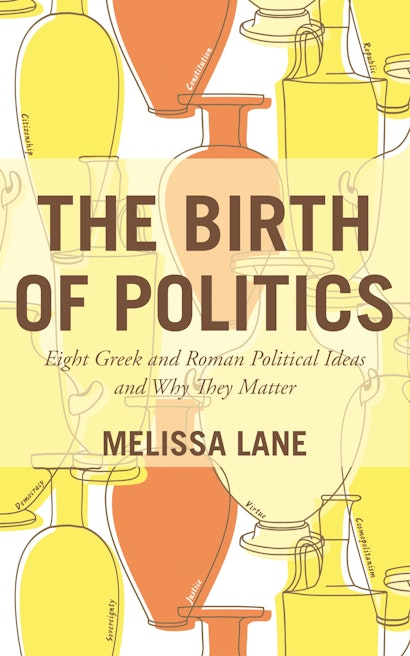In The Birth of Politics, Melissa Lane introduces the reader to the foundations of Western political thought, from the Greeks, who invented democracy, to the Romans, who created a republic and then transformed it into an empire. Tracing the origins of our political concepts from Socrates to Plutarch to Cicero, Lane reminds us that the birth of politics was a story as much of individuals as ideas. Scouring the speeches of lawyers alongside the speculations of philosophers, and the reflections of ex-slaves next to the popular comedies and tragedies of the Greek and Roman stages, this book brings ancient ideas to life in unexpected ways.
Lane shows how the Greeks and Romans defined politics with distinctive concepts, vocabulary, and practices—all of which continue to influence politics and political aspirations around the world today. She focuses on eight political ideas from the Greco-Roman world that are especially influential today: justice, virtue, constitution, democracy, citizenship, cosmopolitanism, republic, and sovereignty. Lane also describes how the ancient formulations of these ideas often challenge widely held modern assumptions—for example, that it is possible to have political equality despite great economic inequality, or that political regimes can be indifferent to the moral character of their citizens.
A stimulating introduction to the origins of our political ideas and ideals, The Birth of Politics demonstrates how much we still have to learn from the political genius of the Greeks and Romans.
Melissa Lane is the Class of 1943 Professor of Politics and a faculty member of the Program in Classical Philosophy at Princeton University. She is also the 50th Professor of Rhetoric at Gresham College. Her books include Eco-Republic: What the Ancients Can Teach Us about Ethics, Virtue, and Sustainable Living (Princeton) and Method and Politics in Plato’s “Statesman.”
"The political ideas of the ancients still endure—and still propel us into debate and even more vigorous conflict. . . . [T]he author successfully illuminates the political ideas that still perplex and divide us."—Kirkus Reviews
"The eight ideas cited in this book constitute the core of politics and can help us to envision what politics should be."—Wan Lixin, Shanghai Daily
"Lane's book . . . offers an enjoyable run through major traditions of classical political ideas. . . . It is thoughtful and challenging, dense and economical without being overwhelming. . . . [Lane] does have an exceptional grasp of political theory . . . and of the connections between ancient and modern political thought, which she communicates admirably."—Joanna Kenty, Bryn Mawr Classical Review
"The author combines a philosophical perspective with history, economics, and anthropology to bring out the complex and ambiguous nature of political ideas and politics itself. . . . [T]he book is an easy read and as interesting as the topic it covers."—Choice
"This impressive work of scholarship well deserves the accolades contained on its back cover. . . . The background research is outstanding in a very accessible style. . . . As an introduction to the political thought of the ancient world, this book is excellent."—Tony Burns, Review of Politics
"The Birth of Politics is a splendid introduction to the world of ancient Greek and Roman political thought. Melissa Lane is a sure-footed and wonderfully knowledgeable guide through the varied terrain of ancient ethics and politics. Her writing is at once profound, engaged, elegant, and lively. Revealing both the familiarity and strangeness of classical thinking about justice, citizenship, cosmopolitanism, and much else, she reminds us why the classics matter today, how often our own political ideas find their antecedents in ancient practice, and how much we still have to learn from the past."—Josiah Ober, author of The Rise and Fall of Classical Greece
"This is the best introduction to ancient political thought—accessible, stimulating, thoughtful, and accurate. Melissa Lane, a scholar of the first rank, is a trustworthy guide who brings recent thinking to bear on the central topics and does an excellent job of writing with an eye to contemporary relevance, without removing ancient thinkers from their very different historical and political contexts."—Kinch Hoekstra, University of California, Berkeley
"This is a lucid, effective, and accessible account of ideas central to Greek and Roman political thought. Melissa Lane does an excellent job of synthesizing important developments in the study of the subject, and she also makes her own subtle, original argument, showing how we might well draw upon the ancients as we think through our own problems."—Danielle Allen, author of Our Declaration


